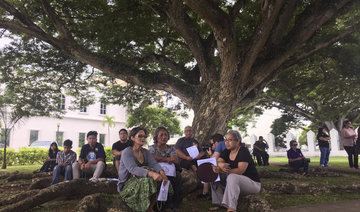WASHINGTON/SEOUL: Defense Secretary Jim Mattis warned on Monday that the US military would be prepared to intercept a missile fired by North Korea if it was headed to Guam, while North Korean leader Kim Jong Un alerted his army that it should always be fire-ready.
Mattis told reporters that the US military would know the trajectory of a missile fired by North Korea within moments and would “take it out” if it looked like it would hit the US Pacific territory.
“The bottom line is, we will defend the country from an attack; for us (US military) that is war,” Mattis said.
North Korea’s official KCNA news agency said Kim received a report from his army on plans to strike the area around Guam, but also said he would watch US actions before making any decisions on next steps.
“The United States, which was the first to bring numerous strategic nuclear equipment near us, should first make the right decision and show through actions if they wish to ease tensions on the Korean peninsula and prevent a dangerous military clash,” Kim was cited as saying in the report by KCNA.
Meanwhile, the European Union’s top diplomat, Federica Mogherini, said the EU would intensify its diplomatic efforts with North Korea, the United States, South Korea, China, Russia and Japan.
Mogherini called on North Korea “to refrain from any further provocative action that can only increase regional and global tensions.”
US officials and South Korea’s president in recent days have played down the risk of an imminent conflict after Washington and Pyongyang exchanged fiery rhetoric last week.
But Mattis told reporters that war could break out if North Korea were to fire a missile at the United States.
“If they fire at the United States, it could escalate into war very quickly,” Mattis said.
President Donald Trump warned last week the US military was “locked and loaded” if North Korea acted unwisely after threatening to land missiles in the sea near Guam later this month.
Mattis said that if a North Korean missile were headed toward the waters near Guam, instead of aimed directly at the island, then the president would decide what action to take.
Concern that North Korea is close to achieving its goal of putting the mainland United States within range of a nuclear weapon has caused tension to spike in recent months.
Tension on the Korean peninsula had eased slightly earlier on Monday as South Korea’s president said resolving North Korea’s nuclear ambitions must be done peacefully.
World stocks rose along with US Treasury yields and the US dollar as investors regained an appetite for riskier investments amid an easing of tensions.
“There must be no more war on the Korean peninsula. Whatever ups and downs we face, the North Korean nuclear situation must be resolved peacefully,” President Moon Jae-in told a meeting with senior aides and advisers.
“I am certain the United States will respond to the current situation calmly and responsibly in a stance that is equal to ours,” he said.
Mattis and Secretary of State Rex Tillerson on Sunday sent a conciliatory message to North Korea in an op-ed piece in the Wall Street Journal, which also appeared aimed at easing China’s concerns about US intentions toward its neighbor.
“The US has no interest in regime change or accelerated reunification of Korea. We do not seek an excuse to garrison US troops north of the Demilitarized Zone,” the officials said, addressing some of Pyongyang’s fears that Washington ultimately intends to replace the reclusive country’s leadership.
The article took a softer tone on North Korea than the president, who warned Pyongyang last week of “fire and fury” if it launched an attack.
“While diplomacy is our preferred means of changing North Korea’s course of action, it is backed by military options,” the two officials said.
REGIONAL ALLIES
Gen. Joseph Dunford, US chairman of the joint chiefs of staff, met South Korean Defense Minister Song Young-Moo on Monday. “He encouraged strengthening trilateral cooperation between the US, (South Korea) and Japan,” US military spokesman Captain Darryn James said.
South Korean Vice Defense Minister Suh Choo-suk highlighted doubts about North Korea’s claims about its military capability.
“Both the United States and South Korea do not believe North Korea has yet completely gained re-entry technology in material engineering terms,” Suh said in remarks televised on Sunday for a Korea Broadcasting System show.
US Central Intelligence Agency Director Mike Pompeo said on Sunday that Kim might conduct another missile test but talk of being on the cusp of a nuclear war was overstating the risk.
“I’ve seen no intelligence that would indicate that we’re in that place today,” Pompeo told “Fox News Sunday.”
However, North Korea reiterated its threats, with KCNA saying “war cannot be blocked by any power if sparks fly due to a small, random incident that was unintentional.”
“Any second Korean War would have no choice but to spread into a nuclear war,” it said in a commentary.
The United States and South Korea remain technically still at war with North Korea after the 1950-53 Korean conflict ended with a truce, not a peace treaty.
Ukraine denied on Monday that it had supplied defense technology to North Korea, responding to an article in the New York Times that said North Korea may have purchased rocket engines from Ukrainian factory Yuzhmash.
Tension in the region has risen since North Korea carried out two nuclear bomb tests last year and two intercontinental ballistic missile tests in July, tests it often conducts to coincide with important national dates.
Tuesday marks the anniversary of Japan’s expulsion from the Korean peninsula, a rare holiday celebrated by both the North and the South. Moon and Kim, who has not been seen publicly for several days, are both expected to make addresses on their respective sides of the heavily militarized border.
Trump has urged China, the North’s main ally and trading partner, to do more to rein in its neighbor, often linking Beijing’s efforts to comments around US-China trade. China strenuously rejects linking the two issues.
Trump on Monday authorized an inquiry into whether to investigate China’s alleged theft of American intellectual property, declaring it “a very big move,” while the country’s largest business lobby group urged the two countries to resolve differences.














